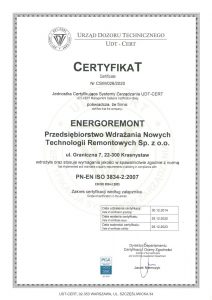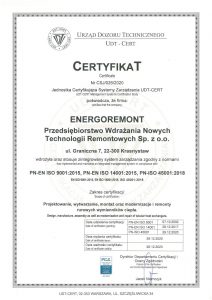Integrated Quality, Environmental Protection, and Occupational Health and Safety
Management System Policy
The Integrated Management System implemented at ENERGOREMONT Sp. z o.o. combines three systems: a Quality Management System as per ISO 9001, an Environmental Management System as per ISO 14001 and an Occupational Health and Safety Management System as per BS OHSAS 18001.
It provides a documented and coherent framework that enables efficient company management through the establishment and implementation of a uniform policy and resulting objectives.
ENERGOREMONT Sp.
z o.o.
is a specialised service and production company providing customers with comprehensive solutions for the design, manufacture, assembly, retrofit and overhaul of shell and tube heat exchangers while maintaining quality standards, ensuring compliance with applicable regulations and taking care of the natural environment and occupational safety.
Our vision
We want ENERGOREMONT to be perceived as a responsible and trustworthy partner identified with the following values:
- Efficient overhaul technology and modern production techniques;
- Professional engineering staff;
- High quality of manufactured equipment and overhaul services;
- Occupational safety;
- Environmental activities.
Our strategic objective:
Our goal is for ENERGOREMONT to become a significant producer of industrial heat exchangers on the European market.
We accomplish our goals by:
- Building lasting and reliable partnerships with customers, suppliers and subcontractors and by cooperation with research and development facilities with a view to improving product quality and service efficiency;
- Perfecting the internal organisation of work based on regularly improved procedures supported by state-of-the-art IT tools;
- Continuous advancement of employee awareness and qualifications, effective motivation in order to increase employee commitment to quality improvement, environmental protection and occupational health and safety;
- Rational and effective use of resources, minimisation and optimisation of costs, and ensuring funds for the implementation of investments to improve the quality of products and services, occupational safety and environmental protection.
Our commitment
- Meeting the demands of customers and other stakeholders, legal requirements and other requirements that we undertake to meet and which relate to environmental aspects and OHS risks;
- Continuous reduction of our environmental impact, prevention of pollutant emissions and segregation of generated waste to ensure recycling and safe disposal;
- Continuous improvement of conditions and results of OHS activities, prevention of accidents, near misses and occupational diseases, and reduction of occupational risks;
- Improving accident and emergency prevention, preparedness and response to minimise harm to people and the environment;
- Ensuring the necessary means and resources and the involvement of all employees in maintaining and continuously improving the effectiveness of the quality, environmental and occupational health and safety management systems.
The Integrated Management System, based on the current EN ISO 9001:2008, EN ISO 14001:2004, PN-ISO 45001:2018 and PN-EN ISO 3834:2007 standards, is an effective tool for implementing this Policy.
This Policy has been agreed upon with employees, is known, understood and implemented by all employees and is publicly available.
President of the Management Board
mgr inż.
Kazimierz Ruszniak
Our certificates
Environmental impact
When identifying the impact of ENERGOREMONT Sp. z o.o.
(identification of environmental aspects) on the environment which can be influenced and supervised by the company, both standard operating conditions and emergency situations are considered.
The identified environmental impacts (environmental aspects) are assessed according to the criteria listed in a procedure titled “Identification of Environmental Aspects”.
Significant environmental aspects related to the direct operations of ENERGOREMONT Sp. z o.o.
include:
- Emission of gases and dusts into the air (welding processes, gas and plasma cutting of steel, volatile organic compounds, so-called VOC);
- Generation of hazardous waste (waste oils and lubricants, waste paints and varnishes, packaging left over from or contaminated with hazardous substances).
Potential impacts that may occur during emergencies are related to:
- Risk of hazardous substances (oils, fuels) leakage – may cause ground contamination;
- Fire and explosion hazards – may cause air pollution;
and generation of waste not generated during normal operation (e.g. start-up of new equipment and machinery).
Magnitude monitoring rules have been established for all identified significant environmental aspects.
Environmental programs are established for significant environmental aspects selected at a given time to reduce adverse environmental impacts.





